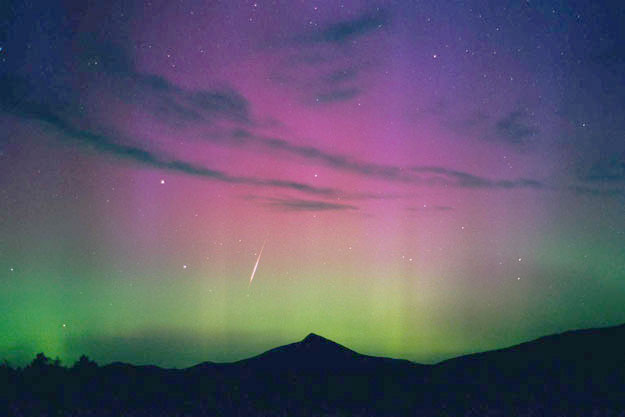Credit & Copyright: Jimmy Westlake
(Colorado Mountain College)
Explanation:
Just after the
Moon set but before the
Sun rose in the
early morning hours of 2000 August 12,
meteors pelted the Earth from the direction of the constellation
Perseus, while
ions
pelted the Earth from the
Sun.
The
meteors were expected as sub-sand grains long left behind by
Comet Swift-Tuttle annually create the
Perseids Meteor Shower.
The aurorae
were unexpected, however, as
electrons,
protons, and
heavier ions raced out from a large
Coronal Mass Ejection that had
occurred just days
before on the Sun.
In the foreground is Hahn's Peak, an extinct volcano in
Colorado,
USA.
The Perseid meteor shower peaks this year over the next few days,
with as much as one bright
meteor per minute visible from some locations.
1999 2000 2001 2002 2003 2004 2005 2006 2007 2008 2009 2010 2011 2012 2013 2014 2015 2016 2017 2018 2019 2020 2021 2022 2023 2024 2025 2026 |
Yanvar' Fevral' Mart Aprel' Mai Iyun' Iyul' Avgust Sentyabr' Oktyabr' Noyabr' Dekabr' |
NASA Web Site Statements, Warnings, and Disclaimers
NASA Official: Jay Norris. Specific rights apply.
A service of: LHEA at NASA / GSFC
& Michigan Tech. U.
|
Publikacii s klyuchevymi slovami:
Perseids - meteor shower - aurora - Perseidy - Meteornyi potok - polyarnoe siyanie
Publikacii so slovami: Perseids - meteor shower - aurora - Perseidy - Meteornyi potok - polyarnoe siyanie | |
Sm. takzhe:
Vse publikacii na tu zhe temu >> | |
